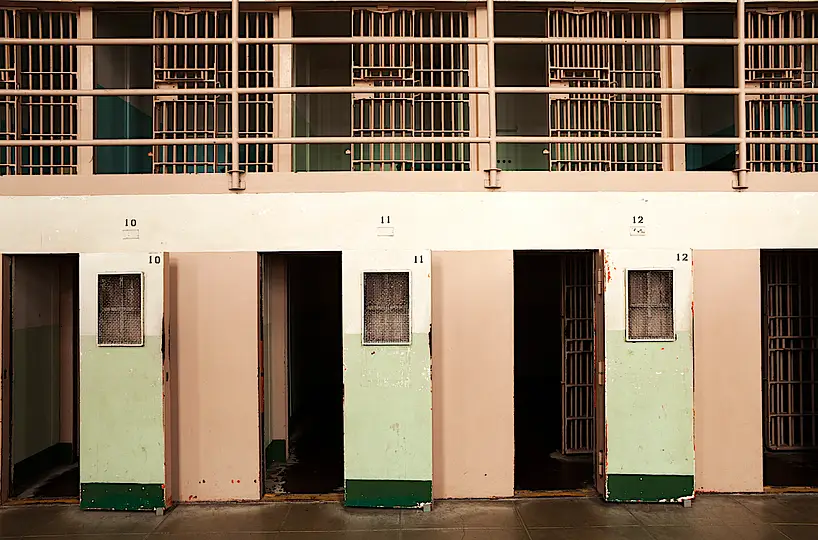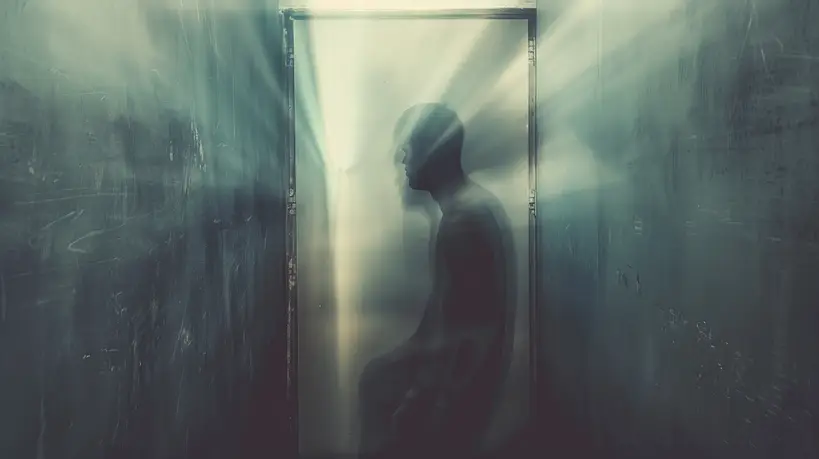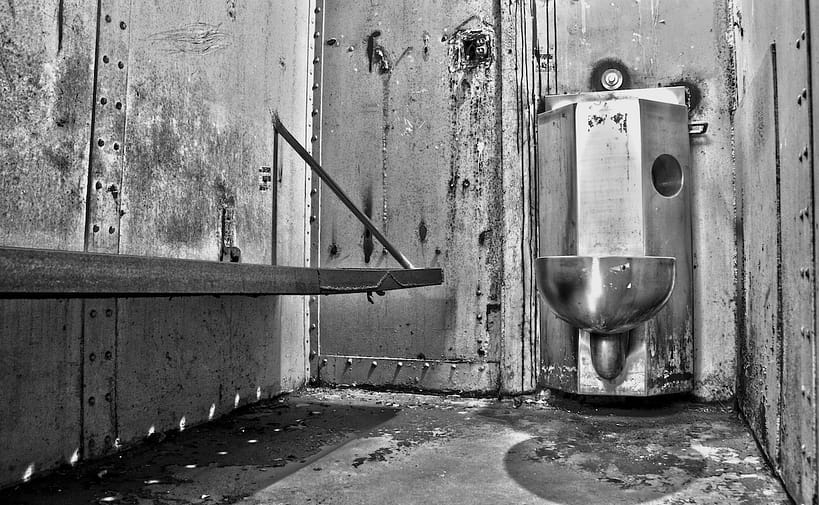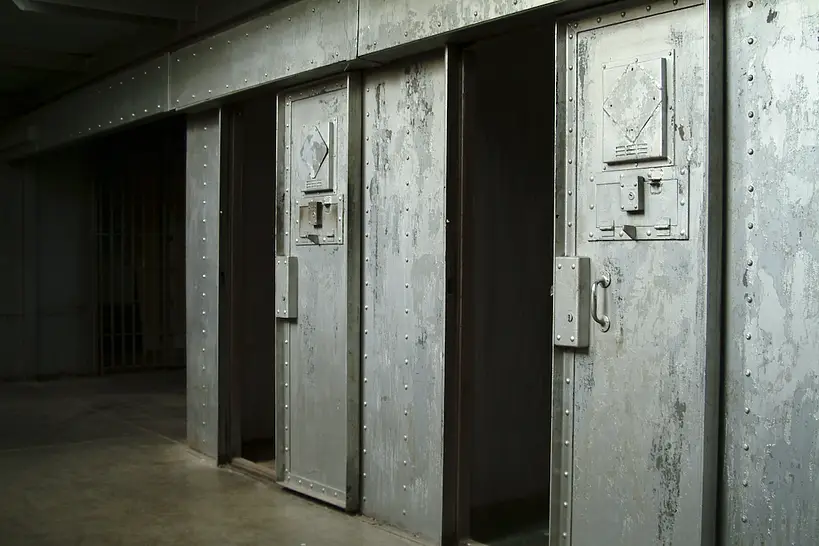Solitary Confinement Deemed Form of Torture, Leaves Permanent Psychological Scars
Solitary confinement, also known as “the hole” or “administrative segregation,” involves isolating prisoners in tiny cells for up to 23 hours a day, often for weeks, months, or even years on end. Often less than 1/4 the size of a typical college dorm room, inmates have a toilet and sink (sometimes all-in-one), and a bed.
Lacking more than a sliver of light, human contact or any sensory stimulation, prisoners in solitary confinement frequently lose all touch with reality. Advocates say it is necessary for managing dangerous prisoners. Critics argue that it is a form of torture that can lead to severe psychological trauma.
The United States is by far the largest user of this extreme punishment. About 6.3% of the federal and state prison population, or 122,000 inmates, are in solitary confinement on any given day, according to a May 2023 report by Solitary Watch and the Unlock the Box. Nearly one quarter of those have been in solitary confinement for years, and 4% for more than a decade. The number of US prisoners in solitary confinement is close to twice the total prison population in many first world countries (e.g. France, Japan, Germany, UK).
This story focuses on the long fight to end solitary confinement in Connecticut.
Keishar Tucker’s Solitary Story
Police arrested Keishar Tucker in Connecticut on a threatening charge in the late 1990s. He was detained in prison waiting for a trial, without bail and without being convicted of anything for 9 months. He spent several months in solitary confinement during that time.
In testimony to the Connecticut General Assembly, Tucker described the experience as a form of psychological torture, and said that the trauma had left him with chronic depression and anxiety. He was 17 at the time.
Tucker’s mother, Barbara Fair, is a national advocate for prison reform. She is one of the many people responsible for reducing the use of solitary confinement in Connecticut. Her work to reform prisons and jails has been a lifelong mission, but, according to Fair, “when my son landed [in solitary confinement] that started my work on… solitary and all the harsh conditions that people had to face in Connecticut prisons and jails and youth detention centers.”
The Lasting Trauma of Solitary Confinement
Fair made it clear just how traumatic her son’s experience in solitary confinement had been. “He’s never been the same, since he finally got out.”
“It’s been like over 20 years of psych meds, psych hospitalizations, drinking, drugging, everything, to cope with what happened to him. I don’t believe I will ever know everything that actually happened to him,” describing the deep scars solitary confinement inflicted.
Fair’s work on solitary confinement finally culminated in 2022 with the passing of the PROTECT Act. PROTECT limits the use of solitary confinement in Connecticut with provisions to further reduce its use going forward.
What Is the PROTECT Act?
The law, which stands for Promoting Responsible Oversight, Treatment and Effective Transparency, has a progressive structure. That means while it initially only required prisons to give people 2 hours out of solitary per day, this increases over time. The required time out of solitary confinement was up to 5 hours as of April 2023
The law also calls for appointment of an ombudsperson to oversee changes in prisons and ensure enforcement. This provision was incredibly important, given how hard the fight to end solitary confinement has been.
Fair’s organization, Stop Solitary CT, was only able to end the use of solitary confinement for children in 2017. Governor Ned Lamont vetoed the original PROTECT Act in 2021. The 2022 law mandating reduction of solitary confinement was actually an updated version of the 2021 bill.
That 2021 bill passed with a bipartisan majority in both chambers of the Connecticut General Assembly. It was partially in response to the U.N. citing Connecticut prisons for violating international guidelines on the use of torture.
Difficult Progress in Fight to End Solitary Confinement
After vetoing the bill, Governor Lamont signed an executive order putting Connecticut’s solitary confinement policy in line with the U.N.’s standard for the bare minimum treatment of prisoners, the so-called “Mandela Rules. ” The standard is meant to outline the behavior necessary to treat prisoners with basic human dignity, and, among other things, say that solitary confinement should “be used only in exceptional cases as a last resort, for as short a time as possible and subject to independent review.”
However, Lamont’s executive order omitted any requirement for oversight of enforcement. “He put forth an executive order which really had no teeth,” Fair said. “There was no monitoring [of prisons to check for compliance] or anything so we were not going to be happy with that.”
Lamont’s veto surprised Stop Solitary CT, as he told them he didn’t think he had a problem with it. Fair changed their legislative strategy in 2022 to ensure the Governor and Department of Corrections supported the new bill.
Partial Victory Achieved, But More To Do
“We met with the Department of Corrections’ administrative staff on a weekly basis or every other week,” said Fair. “We sat down with them and talked about things we’d like to see happen, changes we’d like to see happen in Connecticut. We wanted to work together, as opposed to it being adversarial, and so we worked together and in the end the commissioner came along and said, you know, he wanted to make sure something got passed in 2022.”
The Department of Corrections specifically were against the 2021 bill, with officials telling the Governor it was unsafe. By bringing them into the discussion, Stop Solitary CT was able to build a much bigger coalition.
Despite this greater coalition, Stop Solitary CT did not get everything they wanted. The 2021 bill mandated 8 hours a day outside of solitary confinement. The 2022 bill did not go that far, but Fair maintains that the fight isn’t over.
Solitary Confinement Creates Mental Illness and/or Makes It Worse
“Even 22 hours out of the day, having somebody in a cage, is not rehabilitating them on no kind of level.” Fair said. “All it’s doing is causing a lot of mental illness, which we have gross mental illness within these prisons right now, and all of these people, after this happens to them, are gonna come back to our communities, and so that’s why we just can’t let it go.”
The 2022 law also called for increased mental health care to be given to people who endured solitary confinement. In his testimony to the Connecticut General Assembly, Tucker recounted a story where he started hallucinating in his cell, and when, out of his mind, he stopped walking on the way to the mental health center, the correctional officers responded by macing him.
Mental illness, especially undiagnosed mental illness, is rampant in prisons, and, according to Fair, these provisions were absolutely necessary. “I don’t think [people] really realized how bad the mental health is inside the facilities, and I don’t think they worry too much about providing better care,” she said.
“If you look at their mental health and medical care, it’s been under scrutiny for the longest, and nothing’s improved… they still [haven’t] change[d] anything.”
Appointment of Ombudsperson Critical to Enforcement of Solitary Rules Reform
All of this is contingent on the appointment of the ombudsperson to make sure that the law is being enforced. As of September 2023, the position remains unfilled, but the search committee intends someone in place by year end. [Note: As of July 2024, the contentious process for choosing a Correction Ombuds is still ongoing. The legislature rejected the Governor’s choice, with strong objections from the Black and Puerto Rican Caucus in particular. As of June 2024, the nomination process was set to begin again.]
This appointment is absolutely vital, especially since the law does not appear fully enforced at the time of writing. For example, prior to passing the PROTECT Act, prisons would be locked down periodically for things like the Super Bowl, national holidays, and correctional officer training.
Prison Administrators Continue Opposition to Reform, Blocking Action with COVID, Understaffing Excuses
Prisons have used excuses like COVID and general understaffing to justify their continued use of solitary confinement, but there have been unverified reports that Department of Corrections administrators have refused to hire people in order to continue with their current policies.
“We’re hearing from some of [the incarcerated individuals] that wrote me that they’re not getting the two hours originally they were supposed to get, so we know they’re not getting the five,” said Fair. “And so that’s why it’s so important right now for us to get the ombudsman in place because they’re not going to do what they have to do, even with the law in place, because we have a governor, to be honest, who really doesn’t care.”
Needless to say, the problems which the PROTECT Act was meant to fix have not been solved. The Act limits prison lockdowns to 24 hours per month and requires the institution to provide robust mental health treatment. Without an ombudsperson ensuring enforcement of these provisions, prisons have not been in line with the law.
Subversion of PROTECT Act Through Orwellian Use of Language, Creative Administration
In addition to blatant disregard for the PROTECT Act, the DoC also uses creative administration to avoid certain provisions. Tucker claimed prisons would assign inmates to two-bunk cells and then not assign a second inmate to the cell. On paper, it’s not solitary confinement, but it is, in effect, the same thing.
In other cases, prisoners are assigned to two bunk cells with one other cellmate. However, they are otherwise treated as if they’re in solitary confinement, with minimal time out of the cell. While this might seem marginally better than ‘conventional’ solitary confinement, Tucker reports that it is still extremely psychologically isolating.
Lastly, Corrections officers use terms like “segregation,” “restrictive housing,” and “chronic,” to avoid the solitary confinement designation. In reality, these are all names for the same practice.
Tucker estimates that, although he only endured solitary confinement specifically for 45 days at a time, the creative administration of solitary meant that his period in isolated housing could sometimes last up to 9 months.
Despite Issues, Connecticut Leads Reform Across Country
The worst part is that compared with the whole United States, Connecticut is actually a leader in restricting solitary confinement. Fair, whose work takes her all across the country, reports that activists in other states say “‘we’d like to know how you did what you did.’
They think it’s so amazing…. I guess they think we’re the forerunner, the one’s to try and replicate.”
Still, Fair is quick to qualify Connecticut’s leadership in this area of reform. “I tell them when I meet with them, don’t look at Connecticut like we’re this wonderful state and we’re so progressive,” she says. “Because if it wasn’t for us fighting as hard as we do—and believe me, we have to fight tooth and nail to get any change in Connecticut—if it wasn’t for us fighting we would be no different than their state.”
The lessons Stop Solitary has learned along the way have also shown up in other states.
- California: In California, a lawsuit ended legal indeterminate solitary confinement and instituted due process protections for incarcerated people in 2015. The California Department of Corrections and Rehabilitation has repeatedly violated the settlement. It is currently being required to submit to court oversight.
Real anti-solitary legislation is still yet to be passed in the state. Governor Gavin Newsom vetoed a bill to that effect in 2022. A second bill making its way through the state legislature, has yet to be passed at time of writing.
-
Massachusetts: In this fight, getting the bill passed is usually only the first step, however. Massachusetts restricted use of solitary confinement in 2018, but the Department of Corrections has been determined to avoid the law.
The law defined solitary confinement as keeping someone locked in a cell for 22 hours a day. To sidestep the law, Massachusetts DOC created a new housing designation keeping inmates in cells for 21 hours a day.
The law called for a 12 member oversight committee, made up of prison officials and people from non-profits. But, they were banned from speaking to the press or the public without permission. This restriction was only discontinued after public outcry.
-
New York: In New York, a law was passed in 2021 with veto-proof majorities in both houses. However, New York prisons have repeatedly violated the law. The majority of inmates in solitary confinement are kept there longer than the law permits.
Prison administrators have also used an intermediary step, meant to transition people back into the general prison population. This provision allows them to keep people indefinitely in similar conditions to solitary confinement.
Both New York and Massachusetts’ Departments of Corrections have been sued over these violations.
Both New York and Massachusetts’ Departments of Corrections have been sued over these violations.
Departments of Corrections, Unions Barriers to Reform
In all of these cases, correctional officer unions and Departments of Correction remain the biggest barrier to reform.
They are often aligned with governors who are either against reform explicitly, or simply don’t care enough. For example, former Governor Andrew Cuomo killed multiple anti-solitary bills in backroom deals. He finally caved in to the pressure amid his sexual harassment scandal.
Even in states moving in the right direction, there is often no oversight of correctional officers. Prisons frequently institute internal rules on an “emergency” basis in order to circumvent laws restricting solitary confinement. There also is very little oversight into who is being sent to solitary confinement, and for what.
Disciplinary tickets are rarely thrown out in hearings, and there usually aren’t any consequences for the correctional officer that wrote the ticket. Many reports suggest people get ticketed for extremely minor offenses, such as not complying with orders fast enough. Correctional officers have also, in the past, used false tickets to cover up their overt violence towards incarcerated people.
Needless to say, these systems need robust and authoritative oversight.
Why Is Opposition to Solitary Confinement Reform So Prevalent?
Asked why she thought this problem was so prevalent, Fair pointed to the American culture around criminal justice as the main culprit. “We’re very punitive in our culture,” she said.
“You have to look at over 40% of the people in prison and jails right now are there pre-trial. They haven’t been convicted of anything, but the harm is still being done.
They can’t afford to get out, that’s why they’re sitting in prison. So just think of all the people we’re harming that people just assume they’re criminals even though we have the Innocence Project, [which has shown] hundreds already who were innocent and served—and of course, you have to serve about 25, 30 years before they realize that they’re gonna exonerate you, that you weren’t guilty.
“But just that fact, that people have that in their head—they commit a crime, so that’s it—and those are the same people who, if their child did the same thing, they have the resources to make sure they never have to go through that situation.”
System Doing What It Was Designed To Do
Fair then recounted a story about one of her cousins who had died in prison this past year, and how, at the end, when this man was hooked up to machines to keep him alive, he was still shackled to the bed. Fortunately, Fair was able to use her relationship with the commissioner to get her cousin unbound before his death, but she was still at a loss for words as to why they would do that.
“I mean, my cousin is near death, you have guards in the room, and you felt the need—he’s hooked up to all these machines—and you felt the need to shackle him to the bed, so he has to die in shackles,” she said. “Why should I have to ask [the commissioner to release him]? What’s the mindset of people that do stuff like that?”
This is the society that we live in, where incarcerated people are made to suffer the indignity of dying in literal chains. It’s not that big of a stretch to see that the same people think that incarcerated people deserve the psychological torture of solitary confinement too.
“When people say the system is broken, I say no it’s not,” Fair said. “It’s doing exactly what it’s intended to do.”
My name is India and I’m a second year Computer Science major at the University of Chicago! I’m very interested in digital forensics and making forensic tech available in rural communities.
India Loechinger



